Leptopelis ragazzii is a species of frog in the family Arthroleptidae. The species is endemic to the Ethiopian Highlands on both sides of the Great Rift Valley. Common names Ragazzi's tree frog and Shoa forest treefrog have been coined for it. It is named after Dr. Vincenzo Ragazzi (1856–1929), from the Modena Natural History Society, who explored and collected in Ethiopia.
Boophis blommersae is a species of frog in the family Mantellidae. It is endemic to northern Madagascar and is known from two locations, Montagne d'Ambre and the vicinity of Tsaratanana. There is also a recent from near Bemanevika. The specific name blommersae honours Rose Marie Antoinette Blommers-Schlösser, a Dutch herpetologist and entomologist.

Boophis goudotii is a species of frog in the family Mantellidae. It is endemic to Madagascar where it is widespread on the high plateau of central Madagascar. Records elsewhere are uncertain and many of them represent misidentifications. It is the only Malagasy frog where females are known to be vocal.

Mantella madagascariensis, common names Malagasy painted mantella, Madagascan mantella, Madagascar golden frog, Malagasy mantella and painted mantella, is a species of frog in the family Mantellidae.
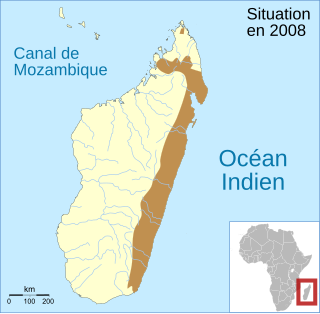
Guibemantis bicalcaratus is a species of frog in the family Mantellidae. It is endemic to Madagascar. Its natural habitats are subtropical or tropical moist lowland forests, subtropical or tropical moist montane forests, and plantations . It is threatened by habitat loss.
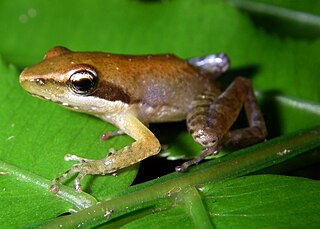
Blommersia blommersae is a species of frog in the family Mantellidae. It is endemic to east-central Madagascar. Both the generic and specific names honour Rose Marie Antoinette Blommers-Schlösser, a Dutch herpetologist and entomologist who collected the type series. Common name Moramanga Madagascar frog has been proposed for it.

Mantidactylus charlotteae is a species of frog in the family Mantellidae. It is endemic to Madagascar and found in the eastern part of the country in the coastal rainforest belt between Marojejy in the north and possibly as far as Andohahela in the south.
Wakea madinika is a species of frogs in the mantellid subfamily Mantellinae. It is the only species in the monotypic genus Wakea. It is endemic to Madagascar.

Boehmantis is a genus of frogs in the mantellid subfamily Mantellinae. It is monotypic, being represented by a single species, Boehmantis microtympanum. The genus is endemic to Madagascar.
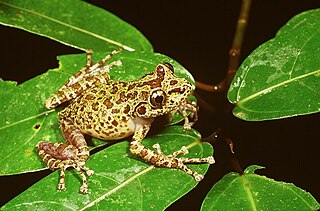
Spinomantis peraccae is a species of frog in the mantellid subfamily Mantellinae. It is endemic to Madagascar and widely distributed in the northern, eastern, and central parts of the island. The specific epithet honours Italian herpetologist Mario Giacinto Peracca. Common name Peracca's Madagascar frog has been coined for it.
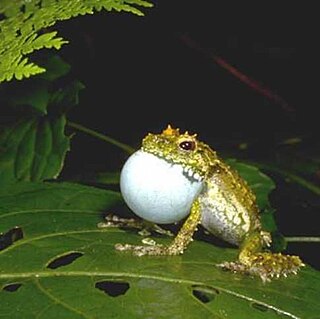
Spinomantis phantasticus is a species of frog in the family Mantellidae. It is endemic to east-central and northeastern Madagascar.
Mantidactylus tricinctus is a species of frog in the family Mantellidae.

Mantidactylus zipperi is a species of frog in the family Mantellidae. It is endemic to Madagascar. Its natural habitat is pristine or only slightly disturbed rainforest. It is usually found near streams. It is threatened by habitat loss.
Amietia ruwenzorica is a species of frog in the family Pyxicephalidae. It is found in the eastern Democratic Republic of the Congo and western Uganda, including the eponymous Rwenzori Mountains on the Uganda/DRC border as well as Kabobo Plateau and Itombwe Mountains in DRC.

Cornufer macrops, also known as the Aresi wrinkled gound frog, is a species of frog in the family Ceratobatrachidae. The specific name macrops refers to the very large eyes of this species. It is endemic to Bougainville Island, in the Papua New Guinean part of the Solomon Islands archipelago. It is only known from the mountains of northern Bougainville Island, near Kunua, although its true range could be much wider.
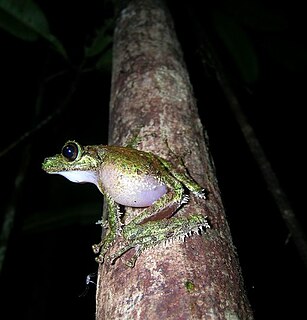
Spinomantis is a frog genus in the mantellid subfamily Mantellinae. This genus is restricted to Madagascar. At present it contains 13 species. They are arboreal or terrestrial frogs and occur in or along small streams. Most species are nocturnal.
Mantidactylus bourgati is a species of frog in the family Mantellidae. The species is endemic to Madagascar.
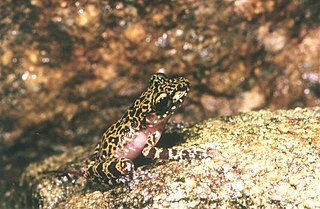
Spinomantis brunae is a species of frogs in the family Mantellidae. It is endemic to Madagascar and known from the Anosy Mountains in southeastern Madagascar.

Spinomantis massi is a species of frog in the mantellid subfamily Mantellinae. It is endemic to the humid forests of northwestern Madagascar.
Zhangixalus jarujini is a species of frog in the family Rhacophoridae. It is endemic to north-eastern Thailand and known from the Kalasin, Roi Et, and Ubon Ratchathani Provinces. The specific name jarujini honours Jarujin Nabhitabhata from the National Science Museum of Thailand. Common name Jarujin's treefrog has been coined for it.














